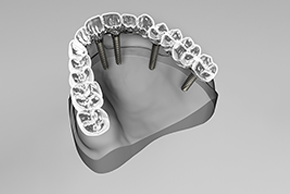Dental implants have changed the practice of dentistry by providing a long-term solution to lost teeth. However, the success of dental implant surgery relies heavily on a well-planned post-operative care regimen, including dietary considerations. In this blog post, we will delve into the intricacies of the dental implant healing process, the role of nutrition in recovery, and, specifically, why you should avoid dairy after a dental implant procedure.

Dental Implant Healing Process
Understanding the healing process is crucial for anyone considering or recovering from a dental implant procedure. This process typically unfolds in several stages:
Stage 1: Osseointegration
Osseointegration is the initial phase where the implant fixture fuses with the jawbone. During this stage, it is essential to promote bone healing and minimize the risk of complications.
Stage 2: Soft Tissue Healing
After osseointegration, the focus shifts to the healing of soft tissues. Proper nutrition plays a pivotal role in this phase, as it supports gum healing and overall oral health.
Stage 3: Prosthetic Placement
Once the implant site is fully healed, the prosthetic tooth or teeth are affixed to the implant. This step completes the dental implant process, allowing patients to regain full dental function and a natural-looking smile.
Role of Nutrition and Dairy in Dental Implant Recovery
Proper nutrition is a cornerstone of successful dental implant recovery. It helps accelerate the healing process, reduces the risk of infection, and ensures that your body has the essential nutrients to support tissue repair and bone growth. While dairy products are often associated with good nutrition, there are reasons to avoid them during the dental implant recovery time:
Why Should You Avoid Dairy After Getting a Dental Implant?
Inflammation and Swelling
Dairy products, such as milk and cheese, might cause inflammation in certain people. Inflammation can stymie healing and result in longer recovery periods.
Acidic Nature
Many dairy products are acidic, which can increase the risk of irritation and discomfort at the surgical site. Acidic foods may also negatively affect the pH balance in your mouth, potentially impacting the healing process.
Lactose Intolerance
Some people have lactose intolerance, which makes dairy products difficult to digest. Digestive issues during the recovery period can be particularly uncomfortable and disruptive.
Calcium and Phosphorus Interference
While dairy is rich in calcium and phosphorus, it may not be the best option during the initial stages of dental implant healing. Excess calcium and phosphorus intake can interfere with the body’s natural healing processes and the integration of the implant with the jawbone.
5 Dairy Alternatives for Dental Implant Patients
Consider these alternatives to dairy instead of dairy to ensure you maintain a balanced and healthy diet all through your dental implant recovery.:
Almond Milk
Almond milk is a nutritious dairy substitute that is a rich source of calcium and can be used in place of regular milk.
Coconut Milk
Coconut milk is a great choice it is high in nutrients and has anti-inflammatory properties.
Soy Products
Soy milk, tofu, and yogurt are excellent dairy replacements that offer protein and calcium.
Leafy Greens
Enhance your daily consumption of leafy greens such as kale and spinach to increase calcium and encourage healing.
Fortified Foods
Look for fortified non-dairy products like almond milk with added calcium and vitamin D for extra nutritional support.
Practical Tips for Patients
Ensuring a smooth dental implant recovery involves more than just avoiding dairy. Here are some practical tips to facilitate your healing process:
Follow Your Dentist’s Instructions
Adhere to your dentist’s post-operative care instructions, including dietary recommendations.
Stay Hydrated
Proper hydration is important for healing, so drink plenty of water.
Soft Food Diet
Stick to soft, easy-to-chew foods to minimize stress on the surgical site.
Avoid Tobacco and Alcohol
Smoking and excessive alcohol consumption can impede the healing process, so it’s best to abstain.
Oral Hygiene
Maintain excellent oral hygiene to prevent infections and complications.
Schedule Your Consultation Today At Tooth Family Dental, Ohio
For personalized guidance on your dental implant recovery and dietary recommendations tailored to your specific needs, consult with the experts at Tooth Family Dental in Columbus, Oh. Visit their website to schedule an appointment and embark on your journey to a healthy, confident smile.
FAQs
Is it good to drink milk after dental surgery?
Dairy products can be inflammatory and interfere with the healing process, thus, drinking milk after dental surgery is typically not advised, especially shortly after the treatment. It’s best to opt for dairy alternatives and follow your dentist’s dietary guidelines.
How long after dental implants can I eat normally?
The timeline for resuming a normal diet after dental implants varies from person to person and depends on the stages of healing. Your dentist will provide specific instructions, but it may take several weeks to gradually transition back to a regular diet.
How can I make my dental implant heal faster?
To facilitate faster healing, prioritize a nutritious diet, maintain excellent oral hygiene, avoid smoking, and follow your dentist’s post-operative care instructions diligently.
How do I know if my dental implant is healing correctly?
Regular follow-up appointments with your dentist are crucial to monitor the progress of your dental implant healing. Signs of correct healing include reduced pain, swelling, and the absence of infection or complications. If you have concerns, do not hesitate to contact your dental care provider for guidance.
